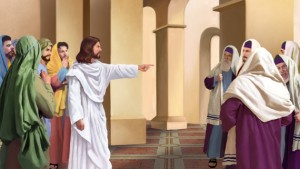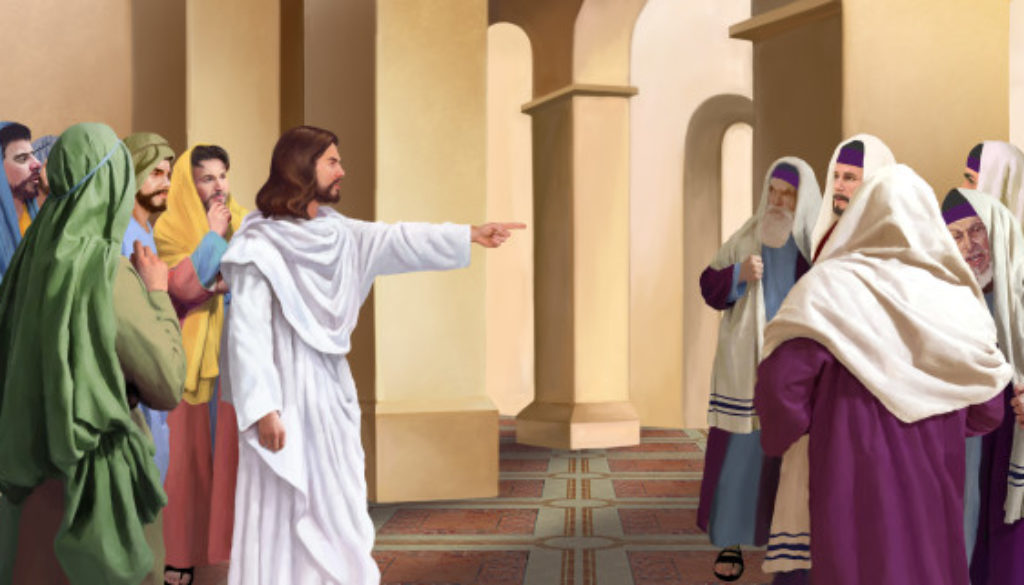Matthew 23:13-36 Woe to the Pharisees

We are still in the temple in Jerusalem with Jesus during His last week this side of the grave. He has bested all those who would test Him. Now He is addressing the crowd and His disciples. I’m assuming that the Pharisees and scribes were at least within hearing distance of Jesus as He addressed the crowd, because of some of His verbiage when pronouncing the woes. He just finished telling them to follow what the Pharisees teach but not to be like them. They are hypocrites, and that is exactly what Jesus will be calling them as we continue on with His message that day.
Jesus begins pronouncing woe’s upon the Pharisees for their conduct. He has quite a few deficiencies to address today concerning this group of people. The majority of the objections Jesus rises He starts out by saying, “Woe to you, scribes and Pharisees, hypocrites.” Needless to say, Jesus is not being gentle with His criticism right now.
The first woe Jesus pronounces is concerning entry into Gods’ Kingdom. Jesus says that even people who are trying everything they know how to do are being told by the scribes and Pharisees that they are not doing the right things to get into heaven. Worse than that, the things that they encourage the people to pursue and believe in do not agree with God’s requirements for entering His Kingdom. I don’t know if the Pharisees and scribes actually believe what they are teaching. Jesus says, “For you neither enter yourselves nor allow those who would enter to go in” (verse 14). They don’t follow God’s laws themselves and convince others to follow their example. One obvious example of this behavior is convincing people NOT to follow Jesus and claiming they don’t know where Jesus’ authority comes from. They know the truth, but admitting it would diminish their authority. They would rather see everyone dammed, including themselves, than to admit the truth and teach it.
The second woe is about what they do to their own new converts. The scribes and Pharisees actively seek out converts (proselytes). Once a new convert is identified and commits to the Pharisees training, what they learn puts them into the same boat as their teachers, drawing away from God and into the traps of their teachings. Jesus says the new convert is “twice as much a child of hell” as the Pharisees are. If their new converts are anything like new converts to anything else, they are so excited about what they are learning that they are always seeking someone else to recruit into their numbers. Great, if the program or cause is honorable, but devastating if not.
The third woe deals with promises or oaths. First off, we know Jesus’ new teaching about oaths. If you missed it you can find it in Matthew 5:33-37 and in the post on Oaths. Jesus said not to make oaths, but He specifically addressed the kind of oaths the Pharisees and scribes are prone to making right now. The current practice is insulting to God. Their practice was to place binding weight on their promises only when it was made on the offering or the gold. “I swear by all the gold in the temple that I will…” or “I swear by all the offerings on the alter this week that…” But if the promise was made on the temple or the alter itself, it had not power to bind the promisor to anything. Such a promise had no teeth in the Pharisees or scribes opinion. Jesus viewed this as extremely hypocritical. The temple represents the presence of God and His promises. God’s promises are EXTREMELY more weighty than ANY offering or gold brought in by man as an offering. God’s presence is what sanctifies what man brings, not the other way around, so therefore promises made on God’s temple or God’s alter or even on Heaven itself are more binding than ANY other promise. These promises are invoking God’s authority, not mans.
The fourth woe concerns where the emphasis is placed on following God’s commands. This one was played out repeatedly in Jesus’ confrontations with the Pharisees in His ministry. The Pharisees were always accusing Him of breaking some small portion of the Law, like when His disciples broke the heads off the wheat and ate it on a Sabbath day. They were trying to enforce compliance with every small detail part of the Law, while ignoring the more important aspect of justice, mercy and faithfulness in the Law. When Jesus chose to heal the man with the withered hand on that Sabbath, the Pharisees were offended. How dare Jesus heal on the Sabbath! Never mind that He was providing mercy for one of God’s children. They overlooked the mercy portion of the Law completely. This Jesus and God abhor! Jesus doesn’t say to drop the adherence to the “less weighty” matters, but to attend to the FULL Law, not just their favorite parts of it.
The fifth woe deals with the contrast of the inside verses the outside. Jesus uses the example of a cup and plate here to illustrate His point. He says that the Pharisees practice of dressing themselves in the most obvious religious garb, is like cleaning the outside of the plate or cup. The surface looks beautiful, but the inside has not been dealt with. Inside the “cup” or “plate” mold and filth remain. Inside the Pharisees’ heart remains greed and self-indulgence, and I would add pride and arrogance to this list. Clean the heart first and then the beauty in the heart will shine forth to the outside, even if it doesn’t have expensive coverings.
The sixth woe repeats the theme of the last one, but adds more emphasis. This was a very important issue to Jesus. This time Jesus compares the Pharisees’ hearts to a whitewashed tomb. This reminds me of a cemetery. The grave markers are carefully maintained, the grass always mowed, and fresh flowers adorn each marker. This is beautiful and shows respect to the deceased. But looking below the soil, you find death and decay. There is no life below the covering of the grass, except that of the insects. The same is true of the dead and decaying heart of the Pharisees. The heart without the life of Jesus. The heart without the promise of eternal life. For under the ground of a headstone of a child of God, there lies a promise. The promise that one day God will give new life to what quietly waits.
I’m going to take a rabbit trail here for a few minutes. I want to talk about burial verses cremation. I have heard some of my Christian family and friends say they don’t want to be cremated because then their body won’t be available for the resurrection of the saints. When the dead in Christ will rise, promised in 1 Thessalonians 4:16. My question is, if God can make light out of NOTHING, what makes you think He can’t gather your ashes from the far reaches of the wind? What about the apostles’ bones? They are SURE to be dust by now. There is no body waiting quietly in a coffin for God to resurrect. God doesn’t need you to “preserve” your physical body for Him to work His amazing promise. For me, I know He can retrieve every part of me from the breeze and I trust Him to make my resurrected body EXACTLY how He wants it to be. I’m going to spare my family the expense of a plot and ask to let this body really fly by releasing my ashes from some mountain top. Rabbit trail ended. Thanks for bearing with me.
The seventh woe is one that I find myself possibly falling into. Jesus condemns the Pharisees for their attitude of superiority over the past generational leaders of Israel. This generation of Pharisees look back through history and condemn their predecessors for their treatment of God’s prophets. They believe that if they lived in the time of the prophets that they would have believed what was being preached by them and followed where God was leading. They would NEVER have murdered the prophets! Yet here they are, just days away from murdering the One who is greater than all the prophets combined! The very Son of God! Jesus says that the Pharisees are certainly sons of the originals that killed the prophets; the apple doesn’t fall far from the tree. He also says that ALL the guilt from ALL the righteous blood shed on earth from Able to Jesus Himself will rest on their shoulders. They will also be responsible for their future treatment of Jesus’ disciples and the church. They have a HEAVY price to pay for their part in the death of God’s own Son.
Father God, I so often look back and wonder how the people could have been so blind and so willingly thrown their hats in with those persecuting the prophets. I often condemn them for their behavior. But I don’t know what my life and walk would have been like if I were in their shoes. I am, once again, SO grateful for being on this side of the promise. Having the history clearly written out for me detailing Your plan and power makes it so much easier for me to truly believe Your words. If I didn’t have such a full account, would I have behaved just like all the rest of those who doubted You? I know You gave demonstrations all along the way, but would the daily demonstrations have made me like Joshua or like all the others? I pray I would have recognized my dependence on You and kept my heart fully Yours. But even on this side of the promise I find my heart is not always Yours. Please forgive me God for my judgement of those who walked before me. Thank You that I didn’t have to take part in actually killing the prophets. But my sin was just as responsible for Your death as any of the Pharisees. Remind me of that every time I start judging others, past, present or future. Thank You for Your forgiveness and Your provision. Thank You too that I was able to share this lesson with my grandchildren. You let me plant some amazing seeds today! I can’t wait to see what kind of fruit comes out of them.




